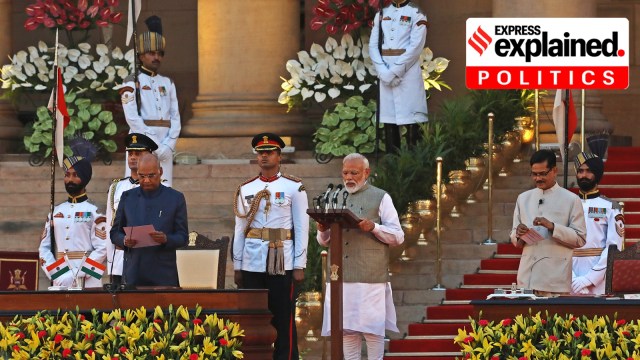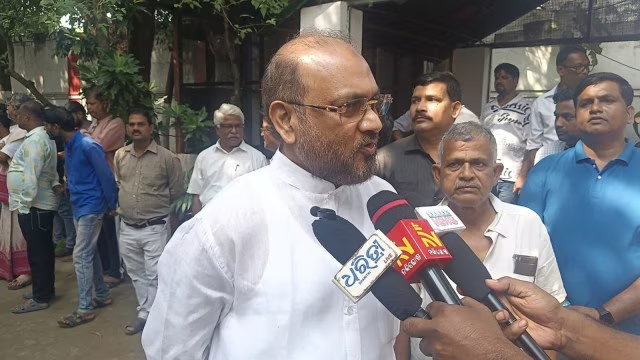Prime Minister-designate Narendra Modi will be appointed to the post at a swearing-in ceremony on Sunday evening (June 9).

What is a swearing-in ceremony?
It is the formal taking of office, where the person set to occupy the office swears to be loyal to the Constitution and to discharge their duties faithfully.
At different levels of government, the oath is administered by different people. For CMs and ministers at the state level, the Governor administers the oath. For the Prime Minister and the Union Cabinet, the President discharges the function. The oath of office to the President is administered by the Chief Justice of India.
Those taking the oath can either swear in the name of God, or simply “solemnly affirm” (more on this later).The ceremony also underlines the layers which make up India’s political power structure, and affirms the supremacy of the Constitution in our polity.
And what exactly do they swear to?
The words of the oath of allegiance for each post are given in the Constitution of India. The President’s oath of office, in Article 60 of the Constitution, says, “I, A. B., do swear in the name of God/solemnly affirm that I will faithfully execute the office of President (or discharge the functions of the President) of India and will to the best of my ability preserve, protect and defend the Constitution and the law and that I will devote myself to the service and well-being of the people of India.”
The Third Schedule of the Constitution details the oaths for other offices. Holders of these offices also take an oath of secrecy.
Story continues below this ad
Form of oath of secrecy for a Minister for the Union:— “I, A.B., do swear in the name of God/solemnly affirm that I will not directly or indirectly communicate or reveal to any person or persons any matter which shall be brought under my consideration or shall become known to me as a Minister for the Union except as may be required for the due discharge of my duties as such Minister,” the Schedule reads.
There are a few variations to these words in the oaths for post-holders at the state level.
Are variations of oaths allowed?
As earlier reported, constitutional experts and those familiar with procedures and rules of swearing-in ceremonies say that Article 164 makes it clear that the text of the oath has to be read out exactly as it is.
Section 3 of the Article states: “Before a Minister enters upon his office, the Governor shall administer to him the oaths of office and of secrecy according to the forms set out for the purpose in the Third Schedule.”
Story continues below this ad
In 2019, Maharashtra Chief Minister Uddhav Thackeray invoked Chattrapati Shivaji and “my parents” before reading out the oath, while his minister Eknath Shinde named Bal Thackeray. While BJP leader Devendra Fadnavis objected and said these acts violated the oath itself, several experts disagreed with that argument.
Former Maharashtra Advocate General Shreehari Aney said: “It is the content of the oath that is important. That should be as per the format laid down in the Constitution. Addition something before or after the oath is not unlawful as long as the substance of the oath is unaltered.”
Similarly, in the Karnataka cabinet’s swearing-in ceremony in 2023, Yamakanmardi MLA Satish Jarkiholi took oath in the name of Buddha and Basavanna, while Chamrajpet MLA Zameer Ahmed Khan took oath in the name of Allah and his mother.
But if a person wanders from the text, it is the responsibility of the person administering the oath — in this instance the Governor — to interrupt and ask the person being sworn in to read it out correctly.
Story continues below this ad
For instance, in 2016, Republican Party of India (RPI) leader Ramdas Athawale forgot to mention his name while taking oath as Minister of State at the beginning of the procedure. Then President Pranab Mukherjee said to him, “Apna naam boliye (say your name)”.
After the 2015 Legislative Assembly elections in Bihar, RJD leader Tej Pratap Yadav was similarly corrected by the Bihar Governor for mispronouncing a word while taking the oath of secrecy. He said upekshit (neglected) instead of apekshit (expected), and was thus asked to re-do the oath. This time around, he fumbled and said jab instead (when) of tab (then). The governor again corrected him, but did not ask for the oath to be re-done.
Who came up with the wordings of the oaths?
The words of the oaths were arrived at after considerable discussions in the Constituent Assembly. One of the sharpest debates was about whether office bearers of a secular state should swear in the name of God.
Even after it was agreed upon that God could be part of the oath, there were disagreements on whether “in the name of God” should come before or after “solemnly affirm”, with one leader even thundering at Dr BR Ambedkar that ‘grammar should not stand in the way of God’.
Story continues below this ad
In the oath in the present form, “swear in the name of God” comes above “solemnly affirm”. The issue came up on August 26, 1949. Mahavir Tyagi, a member from the United Province, alleged that while “the oath was so shaped that the words “Swear in the name of God” were over the line, and “solemnly affirm” were under it,” Dr Ambedkar had later changed the order.
“Now I am sorry that Dr. Ambedkar has come forward just with a little trick — the trick of a school-boy, if he will pardon me. What he has done is, he has brought on the words ‘solemnly affirm’ above the line, and brought God under the line. If it is to be only a trick, I would not mind it. But we should see that the people do not get the idea that now, after Swaraj, God has gone under,” Taygi said.
To this, Babasaheb replied, “Sir, in this matter I must admit that we have really no consistent policy which we have followed. For instance, in article 49, which has been passed, God has been, I think, placed above the line and affirmation below the line… In this article, to which we have moved amendments, we have merely followed the wording of the principal clause, which runs: “Affirm or Swear”. That being the language of the principal clause, the logical sequence was that the affirmation was placed above the line and the oath was placed below. It is a purely logical thing.”
He also said, “Now, the reason why we have thought it desirable to place affirmation first and oath afterwards, was because in this country, at any rate, the Hindu, when he is called upon in any Court of Law to [give] evidence, generally begins by an affirmation. It is only Christians, Anglo-Indians and Muslims who swear. The Hindus do not like to utter the name of God. I therefore thought that in a matter of this sort, we ought to respect the sentiments and practice of the majority community, and consequently we have introduced this particular method by stating the position as to affirmation and oath.”
Story continues below this ad
Tyagi, however, was not impressed, and shot back, “Let grammar not stand in the way of God.”President Rajendra Prasad then stepped in to say, “It is not necessary to have a discussion over this matter. You had better vote on it. It is not a question on which there is room for much discussion. As Dr. Ambedkar has said, he has no particular feeling in the matter.”In the oath in the present form, “swear in the name of God” comes above “solemnly affirm”.This is an edited version of an explainer first published in 2023.
This is an updated version of an explainer first published in 2023.








































